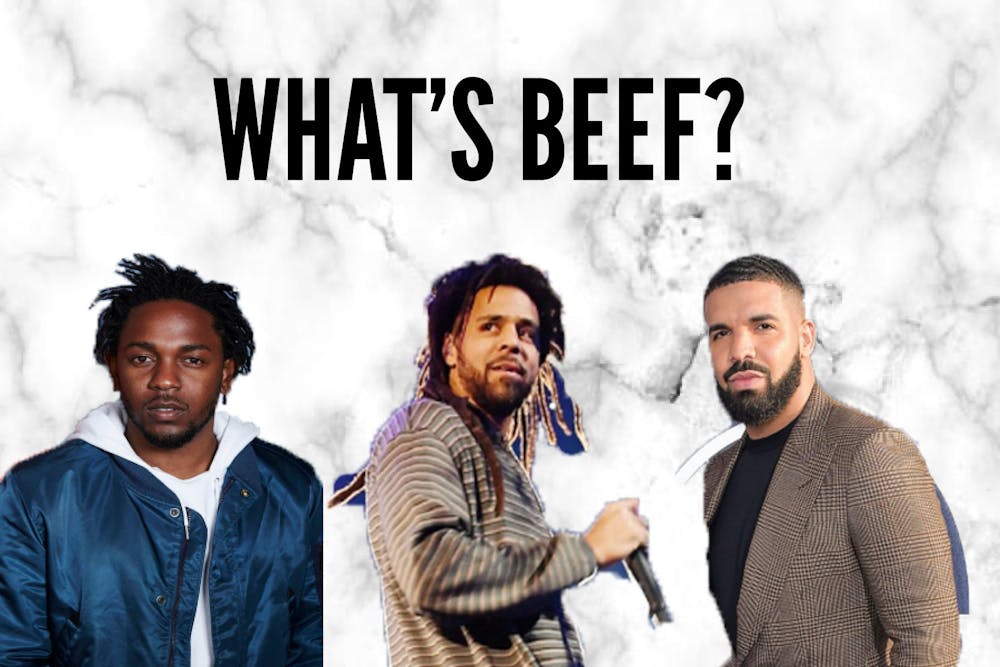Rap's cold war has finally exploded. Under the siren synthesizer of Metro Boomin's beat on “Like That,” Kendrick Lamar delivered the shots heard ‘round the internet’ at fellow hip-hop titans Drake and J. Cole. There will be time later for J. Cole's response, which is the most defiant, controversial and important of the three rappers' entries into this conflict. First, let us look at Kendrick and Drake's offerings, as well as “beef” as a whole — a topic that far predates rap.
Artistic “beef” or “dissing” is a staple of hip-hop but has been an important part of the artistic process in general. Dante’s “Inferno” shares similar aims and contradictions to rap in a multitude of ways, but his depictions of his Florentine rivals, depicting them humiliated in damnation, are certainly medieval disses. Michelangelo's placement of a priest he disliked in hell in his “Last Judgment” is another second-millennium “shot.” A Bernini sculpture in Rome eternally points its posterior toward the room of a monk who was once his artistic rival. The motivation for these artists likely differs little from that of rappers now: if one is talented at expressing and conveying emotion, then why should anger be off limits, especially if the work can realize the fury?
Kendrick's diss is strong: it asserts rap has not a big three but a “big me,” twists Drake's recent album title into a creative threat and, somehow, makes yelling “Bum!” at Drake iconic. Perhaps unexpectedly for some, it is Drake's diss track, which currently only exists via bootlegs online, that is the more impactful work of the two. Drake strikes at Kendrick most effectively at an unexpected angle: he claims the record executive to whom Kendrick was formerly signed, Anthony “Top Dawg” Tiffith, took 50% of his earnings, and may have compelled Kendrick to do features for pop artists as well. It is an effective diss because it undermines Kendrick's admiration for Top Dawg in his music, and thereby questions Kendrick's credibility, which is key to his persona and appeal. Drake also demonstrates his lyrical skill by flipping one of Kendrick's disses against him. Kendrick says on “Like That” that “Prince outlived Mike Jack.” This line plays on Drake's prior comparison of himself to Michael Jackson. Kendrick assigns himself the role of Prince, who is considered by some to be the more impactful musician than Jackson. The rap community has interpreted the line as implying that Kendrick will musically outlive Drake, as some believe Prince musically outlasted Michael Jackson. This is a good diss from Kendrick. Drake responds, “What’s a prince to a king? He a son,” thereby “sonning” Kendrick using his own metaphor. At its best, beef reveals the brilliance of the artist by demonstrating their creative ability through destruction.
The most interesting contribution to the feud, both philosophically and artistically, is that of J. Cole, who released a diss track only to dismiss it during a live performance. He said that the diss rang untrue in his “spirit,” praised Kendrick Lamar's work after denigrating it, and welcomed Kendrick to diss him again, saying he would not reply. In an article for NPR, Sheldon Pearce highlights “[Cole's] characterization of beef as a vicious spectacle: ‘The world wanna see blood [italics removed].’” While many called his apology cowardly, to this author, Cole's response is the bravest and most boundary-pushing entry in the dispute. The greatest art isn't about an artist’s distaste for a specific person, but rather the tormenting questions that come along with the human condition. As Bēkon sings on Kendrick Lamar's “DUCKWORTH.,” “It was always me vs. the world / Until I found it's me vs. me.” A response from Kendrick Lamar could and likely will be riveting and historic. But Cole's wrestling with public expectation, the tradition of the genre he adores, and, according to his apology speech, his relationship with God that beef strains is subject matter far more worth a verse than sparring for the rap throne. In his apology, Cole is searching for personal peace and stumbling along the way. A beef is about the combatants and the parts of ourselves we've invested into them; Cole's confession is about the deep pressures and questions of the human condition, which compose the greatest art.










